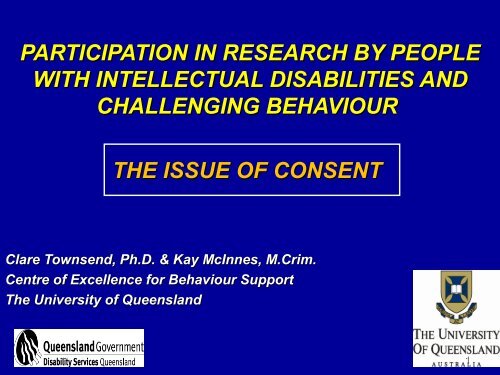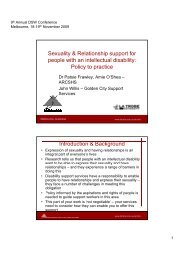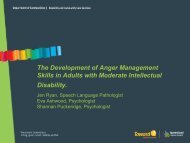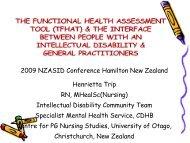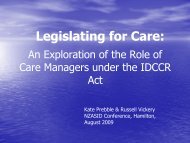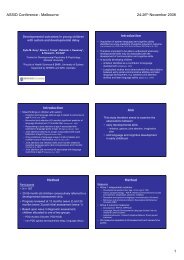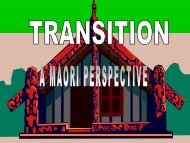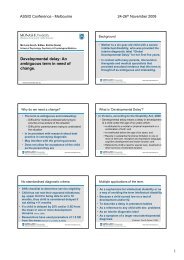CONSENT, ASSENT AND PARTICIPATION IN RESEARCH FOR ...
CONSENT, ASSENT AND PARTICIPATION IN RESEARCH FOR ...
CONSENT, ASSENT AND PARTICIPATION IN RESEARCH FOR ...
- No tags were found...
Create successful ePaper yourself
Turn your PDF publications into a flip-book with our unique Google optimized e-Paper software.
<strong>PARTICIPATION</strong> <strong>IN</strong> <strong>RESEARCH</strong> BY PEOPLEWITH <strong>IN</strong>TELLECTUAL DISABILITIES <strong>AND</strong>CHALLENG<strong>IN</strong>G BEHAVIOURTHE ISSUE OF <strong>CONSENT</strong>Clare Townsend, Ph.D. & Kay McInnes, M.Crim.Centre of Excellence for Behaviour SupportThe University of Queensland1
<strong>IN</strong>TELLECTUAL DISABILITY &CHALLENG<strong>IN</strong>G BEHAVIOUR• 7-15% of people with intellectual disability exhibit forms ofchallenging behaviour.• Gaps exist between their needs & rights, & existinggovernment policy and service systems.• Service responses are frequently crisis driven & ad hoc.• Policy & services fail to facilitate meaningful life in thecommunity.• Restrictive practices are applied.Qureshi, 1994; Borthwick-Duffy, 1994 Emerson et al 1997; Ball, 2004; Holden & Gitlesen, 2006; Beyer & Trice, 2
<strong>IN</strong>TELLECTUAL DISABILITY & CHALLENG<strong>IN</strong>GBEHAVIOUR•Research is needed to improve the quality of life &outcomes for people with intellectual disability &challenging behaviour.•A A complex and infinite array of research issues exist.•Concentrations and gaps in current research exist.(Ashman 1990; Verdugo, 200l; Begab, 1977)3
THE ‘CARTER REPORT’ 2006QLD RE<strong>FOR</strong>M AGENDAThe establishment of a Centre of Excellence forBehaviour Support to lead and guide best practicethrough research and support of the disability sector.Goal: The promotion of the rights of service users &their families & carers in policy , planning, servicedelivery & evaluation.Aim: To facilitate & strengthen systemic approaches toroutine incorporation of stakeholders in thedevelopment, implementation & evaluation of thesystem of care for people with ID and CB.
SERVICE USER <strong>IN</strong>VOLVEMENT <strong>IN</strong><strong>RESEARCH</strong>• The Convention on the Rights of Persons with Disabilities(2006) recognizes the need to ensure that all people who havedisabilities enjoy human rights on an equal basis with others.• Service user participation in research is a benchmark set inhuman rights frameworks, ethical standards & policyworldwide.• However, “While there has been significant uptake of therhetoric of inclusion, this has become muted in the case ofresearch and people with ID”(Marks, 2006,p.2)• There is a limited body of research in the area of service userparticipation in research• Methodologies that meaningfully include people withintellectual disability in research remain unclear and limited(Walmsley & Johnson, 2003) 5
BARRIERS TO SERVICE USER<strong>PARTICIPATION</strong> <strong>IN</strong> <strong>RESEARCH</strong>Access, identification & recruitment;• Communication difficulties (researcher and participant).• Lack of ways to identify participants;• Levels of personal commitment & demands of caring;• Inadequate or inappropriate information & communication aboutresearch;• Lack of interest or overprotection by gatekeepers;Resources & Methodologies• Normative VS Accessible research methods;• Added costs associated with recruitment & data collection;• Inadequate or ill-matched research skills;• A lack of “Courageous” researchers(Walkerdine 2003);• Failures in accountability & follow-up.Bell & Newby, 1977; Burke et al 2003,Gilbert 2004, Kiernan 1999, Lennox et al 2005, Stalker 1998, Walmsley 2004, Ward 1998;Lennox et al; 2005; Lee, 19936
<strong>CONSENT</strong> TO <strong>PARTICIPATION</strong>A key issue surrounding the issue of participation & inclusion inresearch involving people with ID is informed consent.Principles of Consent1.Consent is voluntary;2.Based on sufficient information; &3.Adequate understanding of both the proposedresearch and the implications of participation.People with ID and challenging behaviour aresometimes deemed not to have capacity toconsent to participation in research. This maypose serious barriers to their inclusion &participation. 7
SERVICE USER <strong>PARTICIPATION</strong> <strong>IN</strong><strong>RESEARCH</strong><strong>IN</strong><strong>FOR</strong>MED <strong>CONSENT</strong>• Ethical frameworks that address participation in researchwhere the person is considered unable to consent include:– IASSID: assumed capacity for informed consent, if not areferral is to be made to a proxy;– NHMRC: consent to be sought from guardian ororganization authority by law(National lawStatement on Ethical Conduct in Human Research 2000)• Procedures for ensuring that capacity is present have not beenformally specified or mandated;• There are few ethical and empirical guidelines for constructingrespectful and protective informed consent procedures.Freedman, 2001; Fisher, 20038
<strong>CONSENT</strong> TO PARTICPATE <strong>IN</strong> <strong>RESEARCH</strong>ISSUES SPECIFIC TO QUEENSL<strong>AND</strong> :• The Guardianship and Administration Act 2000excludes psychological research and is silent onsocial and behavioural research.• The CEBS research agenda includes social andbehavioural research & evaluation.• Clear protocols are required that set out how aperson with ID and impaired capacity to giveinformed consent can participate meaningfully insocial and behavioural research.9
<strong>CONSENT</strong>, <strong>ASSENT</strong> <strong>AND</strong> <strong>PARTICIPATION</strong> <strong>IN</strong><strong>RESEARCH</strong> <strong>FOR</strong> PEOPLE WITH<strong>IN</strong>TELLECTUAL DISABILITIES <strong>AND</strong>CHALLENG<strong>IN</strong>G BEHAVIOUR PROJECT 2009-2010.AimTo gain advice & make recommendationsin regard to consent issuessurrounding meaningful inclusion ofpeople with intellectual disability asresearch participants.10
AREAS OF <strong>RESEARCH</strong> FOCUS1. Capacity to consent to research;2. The process for obtaining consent;3. The use of substituted decisionmaking;4. Development of a policy framework,including protocols and guidelines inrelation to informed consent for usewithin the sector.11
METHODOLOGY• Review of literature and legislationrelating to the obtaining ofinformed consent to participate inresearch.• Consultation with relevantQueensland stakeholders, using aquestionnaire and semi-structuredinterviews.12
RESULTS:Literature Findings• Narrow field of study & expertise in developedcountries;• People with ID have been excluded from research;• Inclusion is vital, but ad hoc;• Determining capacity is a major challenge;• There are no universally accepted standards fordetermining capacity;• There is little information for substituted decisionmakers;• There are problems in balancing autonomy withprotection;• Inconsistent legislation, addressed the UK MentalCapacity Act 2005(England and Wales 2005) 13
RESULTSLegislative Inconsistencies in Australia• Guardianship legislation is the main legislation thatcovers capacity and consent.• Inconsistency in State and Territory GuardianshipLegislation e.g.– Medical research may or may not be covered– Social and behavioural research not addressed– Issue of determining capacity is different indifferent jurisdictions14
CONSULTATIVE PROCESSIssues for consultation:– Defining research– Capacity for decision making in research– Substituted decision making– Assent to participation• Conducted in November and December200915
CONSULTATIVE PROCESSA series of semi-structured interviews were conducted.Purposeful & snowball sampling contributed to a group ofstakeholders who were experienced in legislation, research & serviceprovision in intellectual disability and challenging behaviour.Individuals (N=16)NGOsGovernmentResearchersUniversity EthicsAgencies(N=10)Statutory agencies & individuals involved in substituteddecision making regimeRespondents were asked a series of open ended questions.Interviews were transcribed and the data thematically analyzed.
CONSULTATION F<strong>IN</strong>D<strong>IN</strong>GSDiverse Opinions• The status of research determining the decisionmaker (medical/social/intrusiveness);• Day to day matter = informal decision maker?• Formal appointment of a guardian for a matterinclude participation in research?• Restrictive Practices appointments;• Participants were confused about the role ofQCAT in decision making around capacityparticularly in regard to research.18
OUTCOMEProposed Guidelines• Ethical and legislative frameworks;• Gaining ethical approval;• Determining capacity to participate in research;• Avoiding harm, discomfort or inconvenience;• Assessing risks and benefits;• Ensuring the participant’s access to information;• Obtaining informed consent;• Substituted decision making.19
CONCLUSION• There is theoretical acceptance ofpeople’s right to participate inresearch;• “Nothing about us without us seemsto have become muted whereresearch is concerned” (Marks, 2006);• Unresolved issues remain in regardto consent where the person doesnot have capacity20
IMPLICATIONS <strong>FOR</strong> FUTURE<strong>RESEARCH</strong>• Consent issues are only one issue• There are other barriers how substituteddecaModels of decision making in researchwhere people with ID are involved e.g.supported/substituted decision making; if so,who?• Models of inclusion & accessible researchmethods , participatory or emancipatoryresearch• Developing Researcher skills to ensure 21


